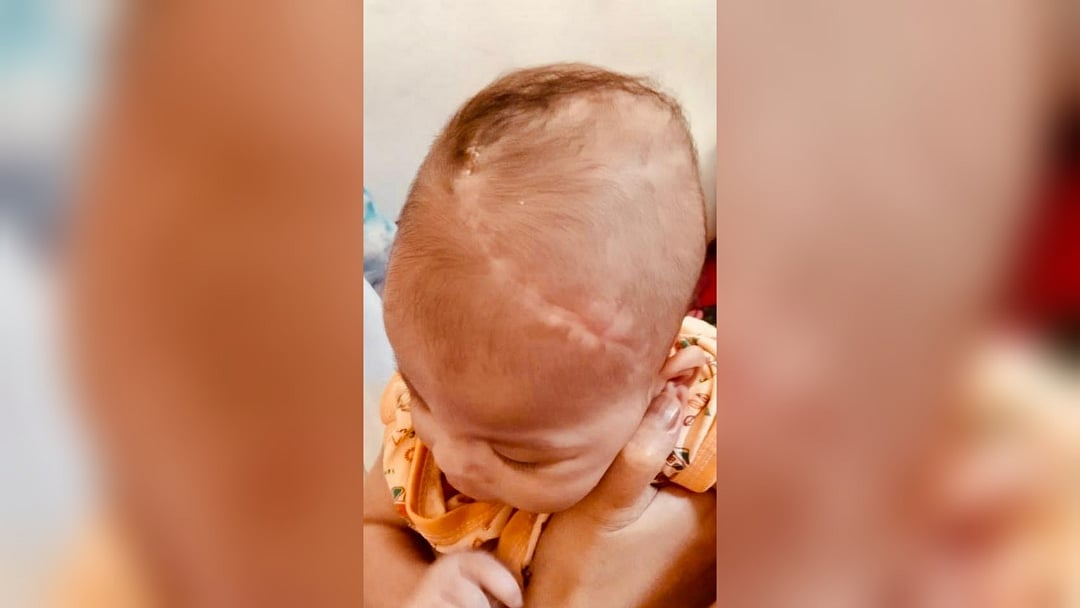Mumbai: Infant with rare skull disease gets new life at hospital
The child was born in a nursing home at Saki Naka and was immediately shifted to the neonatal intensive care unit at Bai Jerbai Wadia Hospital for Children in Parel.

Doctors gave new lease of life to a 1.5-month-old infant who was detected with a rare condition called aplasia cutis congenital leading to a skull defect. The baby whose scalp skin and skull bones weren’t developed underwent scalp rotation and advancement flaps when he was five days old. However, the baby has been discharged and is recovering well.
Aplasia Cutis Congenita is a rare disorder with a complicated pattern of inheritance. Babies are born with the absence of certain layer(s) of skin, most often on the scalp, but also on the trunk, and/or arms and legs. The affected area is typically covered with a thin, transparent membrane. The skull and/or underlying areas may be visible and abnormally developed. Aplasia Cutis Congenita may be the primary disorder or it may occur in association with other underlying disorders.
Parents Afreen and Sanaulla Khan, residents of Tamil Nadu were overjoyed due to the birth of their son. Unfortunately, their baby boy was born with a complete absence of skin and skull bones on his scalp in the central area. The child was born in a nursing home at Saki Naka and was immediately shifted to the neonatal intensive care unit at Bai Jerbai Wadia Hospital for Children in Parel. The skin and skull bones were absent and underlying areas of the brain and its coverings were visible. The child was assessed in detail and all emergency resuscitative measures were taken.
Dr Nilesh Satbhai, Consultant Plastic and Reconstructive Surgeon said the baby boy was born with a very rare deformity ‘aplasia cutis congenital and a large portion of the vital areas of the brain was left exposed. This is a very rare anomaly in which part of the scalp skin along with the skull bones is not developed. As a result, the protective layers of the skull covering the brain are not formed. Depending on the severity and associated morbidities, the reported case fatality rate of aplasia cutis congenital is 20-50 per cent.
“In this child, the skin, soft tissue, and bones over the vertex of the skull were absent. The dura mater covering the brain was exposed. The problem was identified immediately after birth. There is a high chance of infection or meningitis developing in this situation. Also, the large blood vessels in the brain can get infected, or ruptured, leading to bleeding and complications. We operated on the child on day 5 of his life,” he said.
Dr Satbhai further explained that they elevated 2 large flaps from the remaining scalp of the child’s head. Scalp rotation and advancement flap surgery was done wherein these flaps were transposed and rotated across the midline to cover the entire skin defect and protect the dura mater and underlying brain. The flaps survived and healed well, resulting in complete coverage of the scalp skin defect.
“Surgery in infants is always challenging, as the tissues are thin and delicate. The surgery lasted for 4 hours and it was uneventful. The child was strictly monitored and given meticulous post-operative care in the ICU, to ensure a smooth recovery and was discharged after 14 days. The wounds have now healed well on follow-up,” he added.
Dr Minnie Bodhanwala, CEO of Wadia Hospitals, “We have expertise in treating various illnesses and provide uninterrupted services to patients. We use advanced medical technologies to provide precise diagnoses and effective treatments as quickly as possible.”
“The happiness after the delivery of the baby turned into a nightmare for us. We were in a rude shock to see the exposed brain of the baby. But, the doctors at Wadia Hospital correctly detected the rare condition and treated the baby without any delay. We are extremely happy and thank the entire team of doctors who treated our son,” concluded the child’s mother Afreen Khan.